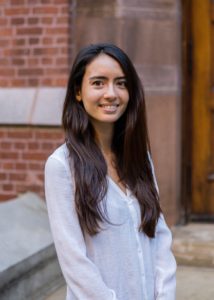Esther Cyna, a leading new voice about the problem of school funding in the United States, recently took some time to answer a few questions about her work.
***
Equity and Excellence: Esther Cyna Discusses School Funding in America
Esther Cyna, PhD Student and Department Doctoral Fellow in History and Education at Teacher’s College, Columbia University, was recently awarded the American Historical Association’s Littleton-Griswold Grant to support a research project titled From Equity to Excellence? Shifting Strategies in School Finance Litigation and Education Policy in North Carolina, 1970s-90s.
Ms. Cyna is a past Fulbright Scholar and currently staffs the School Law Institute at Teachers College and Columbia Law School. She holds a Master’s Degree in American Civilization from the Ecole Normale Supérieure de Lyon and certification in secondary English teaching from the French Ministry of Education. She tweets @esther_cyna.
She recently answered several email questions from The Docket about her exciting work.
The Docket: First, congratulations on being named one of 2018’s three Littleton-Griswold award winners, and thanks for discussing your work with our readers.
Esther Cyna: Thank you very much.
TD: Your title describes a shift from “equity” to “excellence” in school finance litigation. Can you help our readers understand what those terms mean in the context of litigation? What does it mean to prioritize “excellence,” and how does that affect the aims or outcomes of litigation?
EC: Equity and excellence in education are not necessarily mutually exclusive, and I keep a critical distance from these concepts in my work. Scholars in history and political science have identified a shift from a focus on input, especially with desegregation, to a focus on outcomes with standards and standardized testing. The literature calls this paradigm shift “equity to excellence” or “equity to performance,” which some scholars pinpoint in the late 1960s or in the 1980s depending on what processes they examine. There have been competing visions of equity and excellence all along, however, and in fact school finance litigation complicates this narrative: attorneys used the standards that characterize the “excellence” focus in education reform in order to fight for more equity in school funding.
Education reform did significantly transform litigation during the period. From a focus on inter-district equity with cases like the federal San Antonio v. Rodriguez case (1973), which unsuccessfully challenged the Texas school funding formula, attorneys in state cases later focused on a concept of adequacy by riding the standards-based reform wave. Instead of asking courts to equalize funding by challenging funding formulae that relied on property taxes, attorneys focused on obtaining adequate funding for districts that needed it to provide an education that would allow students to meet standards. Adequacy is thus a threshold approach to problems of inequity. In my dissertation project, I look at the relationship between developments in education policy and school finance litigation in North Carolina.
TD: Historians in many subfields (including urban, educational, and legal history) have recently worked to demonstrate how schooling has had a mutual relationship to racial inequality throughout the U.S. What questions do you think your work addresses for historians at large?
EC: This is a central question in my work, especially because standards-based reform, accountability, and the adequacy movement in school finance are often seen as racially neutral in their arguments and rhetoric. But none of these movements happened in a vacuum, and as your question suggests, schooling has often perpetuated racial inequalities. I am exploring this even further, and ask whether it has generated new forms of inequality—testing is a case in point. By the 2000s, talk about the “achievement gap” often replicates a racist frame of thought about racial hierarchies.
In North Carolina, the Leandro case that I examine did not have an explicit racial argument. However, it is impossible to argue that race was no longer a consideration in education at the time. The racially neutral language was political in itself in a period of desegregation backlash. My hope is that this work will contribute to our understanding of what seemingly racially neutral rhetoric, policies and legal arguments imply and what consequences they can hold for public education.
It is inspiring to learn from historians in the subfields that you mention. I am fortunate to work with Ansley T. Erickson, whose work on the relationships between housing and schooling in the context of racial inequality and segregation has been truly groundbreaking in the field of urban and educational history.
TD: As a French citizen and educator, what led to your research interest in school equity in the United States?
EC: This is something that I very rarely think about, partly because the conversation about education in France is completely different from what it looks like in the United States. Questions about how schooling at the primary and secondary level can perpetuate or exacerbate inequalities in France is much more taboo than it is in the United States, where inequalities are more blatant, and where research is easier to conduct. In France the collection of data about race is illegal, which, although it has ethical advantages, limits possibilities for research on discrimination and inequality.
My personal narrative played into my interests as well. I grew up believing that education could only be an instrument for upward mobility. My grandparents came from Poland and Vietnam with nothing but the opportunities that a free public education could afford them. I was struck when I first heard about education as unfair and limiting. I have tried to understand exactly how that works since then.
TD: You have had a very wide-ranging professional engagement with education as a teacher and as an historian. Can you share any of your major experiences in France, North Carolina, or New York? How do you see your professional work and scholarship interacting?
EC: I have taught and learned in drastically different settings, and it is the contrast between those experiences that has cultivated my interest in the role that education can play in maintaining and reinforcing social stratification. In France, I taught French language classes to refugees through an organization called Les Restos du Coeur. I then taught French courses at Duke University, which exposed me to what extreme privilege can look like.
At Teachers College, I work as a graduate assistant for the collaborative Harlem Education History Project. Conversations about the relationship between an institution like Columbia University and Harlem communities have really informed my understanding of what respectful scholarly work entails.
Not every experience I have had interacts with my research, however. For about two years now I have taught weekly evening classes in a women’s jail on Rikers Island through a volunteer organization called the People’s Education Initiative. This has been a humbling and eye-opening experience for me as an educator, but I have refrained from taking this beyond teaching. Because my students are incarcerated, they would not be able to participate in the conversation if I took this into an academic space. I also believe other scholars are better positioned than myself to responsibly talk about questions of mass incarceration, and many already do it well.
TD: Your research includes work on Durham, NC, part of the booming Research Triangle. Do you think that the area’s growth and prosperity, with residents moving from outside of the South, affects the politics of school funding?
EC: This is something that has recently emerged from my research. What you describe is the result of intentional policies that sought to sell the region as a hub for technology and medical research. The political leadership and business leaders worked hand in hand. Their concerted efforts very much shaped public education in the region, with the rationale that better performing schools—and again, there were competing visions of what that meant—and urban “revitalization” through schools would attract businesses that were looking for a skilled workforce. This gets into the transition in the economy from an industrial to a computer-based, information-heavy model in the 1980s and 1990s, which is the period I focus on the most. Just looking at the tremendous influence of IBM in the Research Triangle region is enlightening. IBM as a firm really pushed for standards-based reform at the national, state and local level. In the Research Triangle, they played an important role in local politics, for example in Durham where they successfully pushed for merging the urban and suburban school districts.
This raises geographical questions, because large businesses did not have the same incentives in urban and rural areas—the latter struggled to transition to a different economic landscape, and people struggled when activity in the textile industry declined. Attorneys who litigated the North Carolina school finance case directly addressed disparities between rural and urban areas in terms of resources and economic development.
TD: Thank you, Esther!


